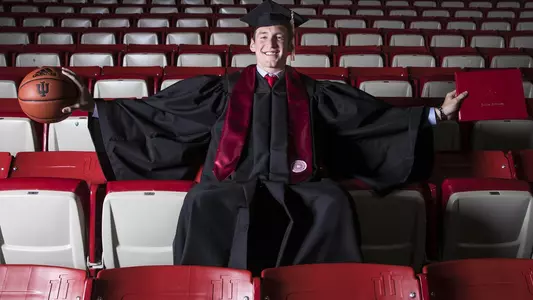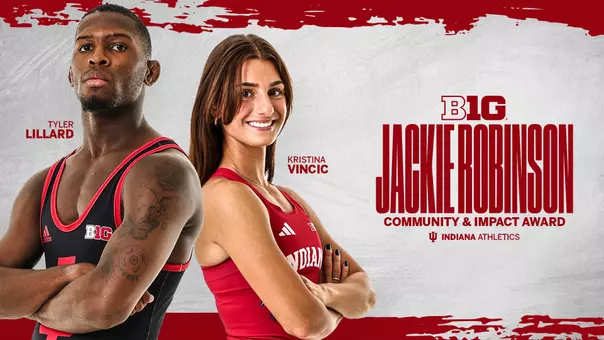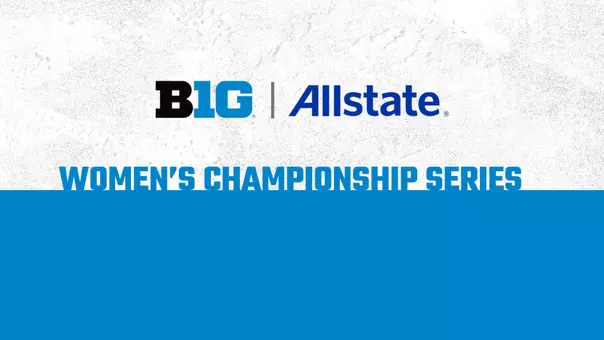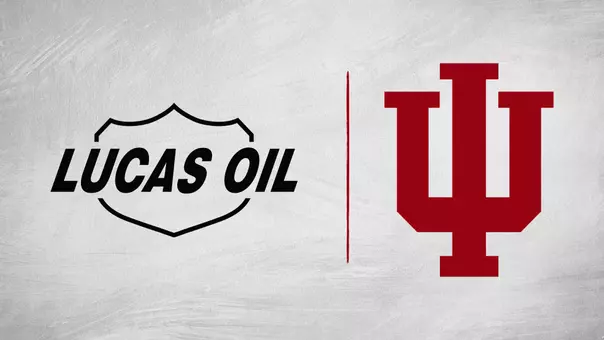Indiana University Athletics

First-of-Its-Kind Policy: Student Athlete Bill of Rights
10/5/2018 7:08:00 AM | General, Student-Athlete Services
IUHoosiers.com will highlight the people, places, things and decisions that have made Indiana University Athletics the leader in innovation and innovative thinking in intercollegiate athletics.
BLOOMINGTON, Ind. – At Indiana, student-athletes come first.
Sure, a lot of schools say that, but few back it up, certainly not as forcefully as the Hoosiers do under athletic director Fred Glass.
Case in point – Indiana's Student Athlete Bill of Rights.
It's been a little over four years since Indiana debuted this first-of-its-kind initiative, and if you thought other universities would rush to duplicate it, think again.
The Glass-inspired bill remains unique in college athletics.
"When we put it out there," Glass says, "I would have thought we'd be one of many by now. In fact, we're not. It's still an unusual thing."
That's exactly the way he wants it. Setting a standard other universities refuse to meet gives Indiana a much-needed edge in the ruthlessly competitive world of college athletics.
"We might not always be the only school, but we will always be the first," he says. "And, for this, we're still pretty only."
Why is that?
"I think it's because a lot of concepts of the Bill of Rights run contrary to intercollegiate athletics," Glass says. "People haven't followed on that."
To understand what that means starts with knowing what the Bill of Rights is. Specifically, it's a way to show student-athletes that IU has their backs, that school officials care about them as people and students as well as athletes, that the university sees them more as partners than participants.
What does that mean?
Let's take a look at the Bill of Rights actually is:
1. Cost of Education. That means a full scholarship of tuition, room and board, books, fees, summer school and a possible Olympic redshirt year, plus other cost-of-living expenses.
2. A four-year scholarship commitment regardless of injury, illness or athletic performance. In other words, a coach can't take away scholarships if players aren't good enough or are injured.
3. A lifetime degree guarantee, which means if student-athletes leave school early (such as to pursue a professional career), but decide to return later to finish their degree, IU will pay their tuition as long as they were in good standing with the university when they left.
4. Comprehensive academic support that includes access to the Shuel Academic Center and free access to tutors, mentors, personality assessments, career development programs and more.
5. Comprehensive health, safety and wellness. Student-athletes will have access to comprehensive health, dental, vision, psychological and rehab care, plus a state-of-the-art training table.
6. Comprehensive Athletic Support. That means student athletes will have elite coaching and training.
7. Comprehensive leadership and life skills development. This comes through the Excellence Academy, a one-of-its-kind facility situated in Memorial Stadium. It helps student athletes prepare for a career after college.
8. A culture of trust and respect. That means no physical or verbal abuse, and no demeaning actions.
9. A Collective Voice through the Student Athlete Advisory Committee (SAAC), with allows student athletes to meet with Glass every semester, also be part of any coaching or athletic director search, have input on decisions affecting the athletic department, and more.
10. Cutting Edge Technology. That includes each student athlete receiving an iPad, unprecedented wireless access, and more.
A lot of other schools, Glass says, want no part of something like this.
"I think sometimes people who were brought up in intercollegiate athletics are more hesitant to make athletes a full partner than we are. They don't like the four-year scholarship guarantees, the lifetime-degree guarantees, giving a lot of power to the Student Athlete Advisory Committee.
"They don't want to follow it, so it's still a distinguishing feature for us."
Glass has spent his decade-long run as athletic director striving to separate IU from the rest of the Big Ten, and beyond. The challenge -- do so without the huge budgets schools such as Ohio State, Michigan and Penn State enjoy.
The fact that Glass arrived with a background in law and community service, rather than athletic administration, gave him an outside-the-box approach that has accelerated that separation.
"I don't think I set out to be different, but I am inherently different in all the good and bad that entails. I probably made some mistakes that someone with more of a background in intercollegiate athletics wouldn't have made. I also did some things that I was too dumb to realize shouldn't be done or couldn't be done, and did them. That's made a big difference.
"I didn't set out to be a maverick, but I think that's the natural conclusion coming from a background other that intercollegiate athletics."
Beyond that, Glass says, "The other thing that was helpful was my experience in public service emphasized to me how fast these things go. If you're elected governor or mayor, you have four years, maybe eight years, and then you're done. If you're not thinking about what your legacy is going to be when you walk in the door, then it's almost too late.
"Early on I had an agenda I wanted to work on. I didn't know how long I would be here. So we've been ambitious and aggressive in what we're trying to do."
The result – the Hoosiers continue to leave other schools in their wake, with no end in sight.
Sure, a lot of schools say that, but few back it up, certainly not as forcefully as the Hoosiers do under athletic director Fred Glass.
Case in point – Indiana's Student Athlete Bill of Rights.
It's been a little over four years since Indiana debuted this first-of-its-kind initiative, and if you thought other universities would rush to duplicate it, think again.
The Glass-inspired bill remains unique in college athletics.
"When we put it out there," Glass says, "I would have thought we'd be one of many by now. In fact, we're not. It's still an unusual thing."
That's exactly the way he wants it. Setting a standard other universities refuse to meet gives Indiana a much-needed edge in the ruthlessly competitive world of college athletics.
"We might not always be the only school, but we will always be the first," he says. "And, for this, we're still pretty only."
Why is that?
"I think it's because a lot of concepts of the Bill of Rights run contrary to intercollegiate athletics," Glass says. "People haven't followed on that."
To understand what that means starts with knowing what the Bill of Rights is. Specifically, it's a way to show student-athletes that IU has their backs, that school officials care about them as people and students as well as athletes, that the university sees them more as partners than participants.
What does that mean?
Let's take a look at the Bill of Rights actually is:
1. Cost of Education. That means a full scholarship of tuition, room and board, books, fees, summer school and a possible Olympic redshirt year, plus other cost-of-living expenses.
2. A four-year scholarship commitment regardless of injury, illness or athletic performance. In other words, a coach can't take away scholarships if players aren't good enough or are injured.
3. A lifetime degree guarantee, which means if student-athletes leave school early (such as to pursue a professional career), but decide to return later to finish their degree, IU will pay their tuition as long as they were in good standing with the university when they left.
4. Comprehensive academic support that includes access to the Shuel Academic Center and free access to tutors, mentors, personality assessments, career development programs and more.
5. Comprehensive health, safety and wellness. Student-athletes will have access to comprehensive health, dental, vision, psychological and rehab care, plus a state-of-the-art training table.
6. Comprehensive Athletic Support. That means student athletes will have elite coaching and training.
7. Comprehensive leadership and life skills development. This comes through the Excellence Academy, a one-of-its-kind facility situated in Memorial Stadium. It helps student athletes prepare for a career after college.
8. A culture of trust and respect. That means no physical or verbal abuse, and no demeaning actions.
9. A Collective Voice through the Student Athlete Advisory Committee (SAAC), with allows student athletes to meet with Glass every semester, also be part of any coaching or athletic director search, have input on decisions affecting the athletic department, and more.
10. Cutting Edge Technology. That includes each student athlete receiving an iPad, unprecedented wireless access, and more.
A lot of other schools, Glass says, want no part of something like this.
"I think sometimes people who were brought up in intercollegiate athletics are more hesitant to make athletes a full partner than we are. They don't like the four-year scholarship guarantees, the lifetime-degree guarantees, giving a lot of power to the Student Athlete Advisory Committee.
"They don't want to follow it, so it's still a distinguishing feature for us."
Glass has spent his decade-long run as athletic director striving to separate IU from the rest of the Big Ten, and beyond. The challenge -- do so without the huge budgets schools such as Ohio State, Michigan and Penn State enjoy.
The fact that Glass arrived with a background in law and community service, rather than athletic administration, gave him an outside-the-box approach that has accelerated that separation.
"I don't think I set out to be different, but I am inherently different in all the good and bad that entails. I probably made some mistakes that someone with more of a background in intercollegiate athletics wouldn't have made. I also did some things that I was too dumb to realize shouldn't be done or couldn't be done, and did them. That's made a big difference.
"I didn't set out to be a maverick, but I think that's the natural conclusion coming from a background other that intercollegiate athletics."
Beyond that, Glass says, "The other thing that was helpful was my experience in public service emphasized to me how fast these things go. If you're elected governor or mayor, you have four years, maybe eight years, and then you're done. If you're not thinking about what your legacy is going to be when you walk in the door, then it's almost too late.
"Early on I had an agenda I wanted to work on. I didn't know how long I would be here. So we've been ambitious and aggressive in what we're trying to do."
The result – the Hoosiers continue to leave other schools in their wake, with no end in sight.
IUBB Postgame Press Conference
Tuesday, February 10
Darian DeVries Postgame Press Conference
Tuesday, February 10
IUWBB Highlights vs. Purdue
Sunday, February 08
IUWBB Postgame at Wisconsin
Thursday, February 05




